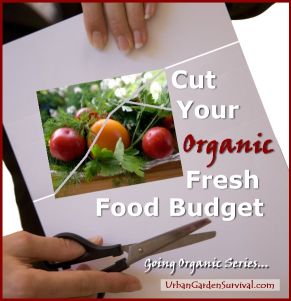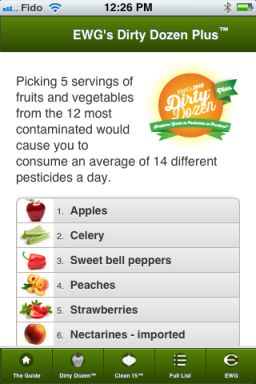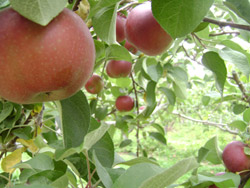Isn’t Organic Food Expensive?
Here are some suggestions on how you can save money while eating organically…
 I think perhaps the most common objection I hear to trying to eat organic food, is that it is too expensive, and they cannot afford it. Obviously, I am not going to sit here and tell you that buying organic produce and other foods is ‘cheap’… It can be quite expensive depending on how you go about it… But there are still some things you can do if you happen to be on a tight budget, or if you just want to make sure you are getting the best value for your dollar.
I think perhaps the most common objection I hear to trying to eat organic food, is that it is too expensive, and they cannot afford it. Obviously, I am not going to sit here and tell you that buying organic produce and other foods is ‘cheap’… It can be quite expensive depending on how you go about it… But there are still some things you can do if you happen to be on a tight budget, or if you just want to make sure you are getting the best value for your dollar.
Below are some ideas to get you started:
1. Make Small Progress to Start
Remember that you don’t have to do it all at once… Start with deciding on one or two items that you know are affected most by pesticides. As you might already know, there are some items of fresh produce that are subjected to a cocktail of chemicals in the effort to make them more ‘attractive’ as well as to increase their shelf life, allowing longer distances for transporting to a point of sale.
The Environmental Working Group (EWG) actually provide a list of the most affected fresh produce items… These include celery, strawberries, spinach, blueberries, potatoes, peaches, bell peppers, and even good old apples! If you check out their site at the link below you will find the “EWG’s Shoppers Guide to Pesticides in Produce” , and you can even download an app for your mobile phone if that is more convenient for you when you are shopping.
Get the “Dirty Dozen” & “Clean Fifteen” Info Here
Plus you can search your Mobile App Store for “Dirty Dozen” to find the app for your phone… Is should look a little like this…

2. Check Out the Local Farmers Markets.
I mentioned this in my last article… and really this can be a great money saver as well as making sure you are getting very fresh produce. Most produce markets will at least have ‘Organic’ stands, however, you can often find totally Organic Markets, where everything is organic or at least pesticide free.
Good old Google is a great place to start if you need to find some Markets in your area, and if you are in the US you can check out the Local Harvest website and see if they have anything listed in your area.
If you are in Australia, you can head over to Australian Farmer’s Markets Association and see if you can find anything listed near you… Of course, don’t forget ‘word of mouth’, just asking a few different people do they know of any local fresh food markets can also help you find what you are looking for.
Buying your fresh fruit and veg from local growers not only can be much better for you, it also helps support the local economy which is a big plus!
3. Remove Processed Foods from Your Diet
This might seem to be a bit difficult to start with, but if you work at one thing at a time, it is going to be a whole lot better for your health and your wallet.
Processed foods, while they can seem to be convenient, are actually expensive… Obviously, time and money goes into manufacturing, packaging and marketing these foods. Not only are you paying for what goes into producing these foods, you also have no control and often no idea of what really goes into them. Clearly, the companies producing these foods are doing so to make a profit. Their prime objectives rarely include you and your families health as a top priority. As a result you will see things like “Canola Oil” which is being marketed as a ‘healthy’ oil (nothing could be further from the truth if you do a bit of research).
Companies, would rather believe the ‘propaganda’ behind what they include in their food products, so long as it means a better bottom line for their profits.
Processed foods can never provide the same level of nutritional value as fresh food can, so replacing processed foods with fresh can also be one good way to start saving money, and improving your health… all at the same time!
Just take a bit of a stock take on the foods in your refrigerator, freezer and pantry, and consider the percentage of processed foods you are currently consuming… And don’t forget, that even buying bread that has already been cooked, is actually purchasing processed food.
Start reading labels and aim to consume the most nutrient dense foods you can, and providing you buy wisely, you will soon start to see and feel the benefits…
4. Buy Bulk or On Sale then Can, Dry or Freeze it.
Ok… so this is most definitely one way you can start saving a ton of money on your food bill… Yes… it does take a bit of effort, but really it can be quite a bit of fun once you get into it, and you become familiar with just how easy it is to do some of your own food preserving. Once you become familiar with it, you might even want to invest in a good quality food dehydrator, vacuum sealer, mylar bags, food storage buckets and shelving… You might want to purchase some canning equipment and maybe even some containers specifically made for freezer food storage.
Again… Don’t try to do too much at once… Start with one method and become skilled at that, and then add another. My favourite is drying foods. I like that best because it is light and easy to store and if you get a hold of items like the vacuum sealer you can actually build up a store of food that you can use for your family camping or hiking trips… or to make sure you have an emergency food supply on hand.
It’s the same money-saving concept that people have been using for years and you can apply it to organic foods as well. Invest in a food dehydrator, canning equipment and freezer-ready containers, so you can store organic foods for later eating.
If you plan and can set things up right, assuming you have the space (be creative here if you are a bit short of space), then you can save a lot of money, not just on food but on other household items that you purchase… even things like toilet paper can be purchased in bulk and when it is on special.
5. Start With Eating One Fully Local and/or Organic Meal a Week.
This is a great idea for getting started, and it gives you the opportunity to ‘work your way‘ into changing your eating and buying habits. One meal a week should be reasonably economical, but don’t forget, once you get to having more organic meals, then you’ll be able to take advantages of bulk buy’s and specials…
Also, don’t forget to make good use of leftovers, and don’t just throw them away. It is always a great money saver if you can stretch your food to do two meals instead of one… At the very least, don’t forget to compost your organic food scraps!
6. Eat more vegetarian meals.
Maybe you are already a Vegan or Vegetarian, but if not, then even though you might be reluctant, try eating more vegetarian meals. If you experiment with some different recipes, you might be very surprised just how delicious these can be, and if you remove meat from the meal, you are automatically saving money.
At the very least, if you simply can’t or won’t remove meat from your meal, then at least cut it right back to a smaller portion and increase the portions of the veggies… One way to do this and not even notice, is to make meals like Stir Fries or Vegetable Soup (add some cooked beans like Red kidney or Canellini to your soup to add even more flavour
7. Pick your own.
This is a really great idea, but it will depend a little on where you live. Some farmers will allow you to ‘Pick Your Own’ fruit and veg. and in the process charge you a lot less. This is not only a great way to save money, but you can get some extra fresh ari and exercise at the same time!! A win-win… 🙂
 There is a lot more opportunity for this in the United States, than say, here in Australia, however, if you are unsure as to whether or not this is possible near you, then maybe approach some farmers and see if they are open to the possibility.
There is a lot more opportunity for this in the United States, than say, here in Australia, however, if you are unsure as to whether or not this is possible near you, then maybe approach some farmers and see if they are open to the possibility.
Don’t forget to make the most of the “you pick” opportunities by getting enough to can, dry and freeze. Take a look for ‘you picks’ in your area by visiting PickYourOwn.org, but make sure you confirm they are organic growers first. You can even find some places in Australia on the same site.
8. Grow Your Own
This possibly goes without saying, and really I have saved the best tip for last. Just like, picking your own, the more you can grow yourself, the more money you can potentially save. Even if you don’t have a lot of space, if you get clever at growing in containers or vertical gardening, you will be able to supplement your fresh food supply to some degree.
Not only can you save and benefit from growing your own, but you are developing skills that could turn out to be life-saving in the event of a disaster or some unexpected emergency situation.
Don’t Wait to Get Started!
When it comes to eating organic and saving money, every little bit helps. The better you get at implementing all these tips the more money you will save, and the better off you and your family will be. And remember, the long term health benefits of eating more naturally will likely save you plenty in health costs in the long run.
So keep a look out for the next part in our Going Organic Series… where I will discuss what it really means by ‘organic’….
Have a great day…
Leave a Reply